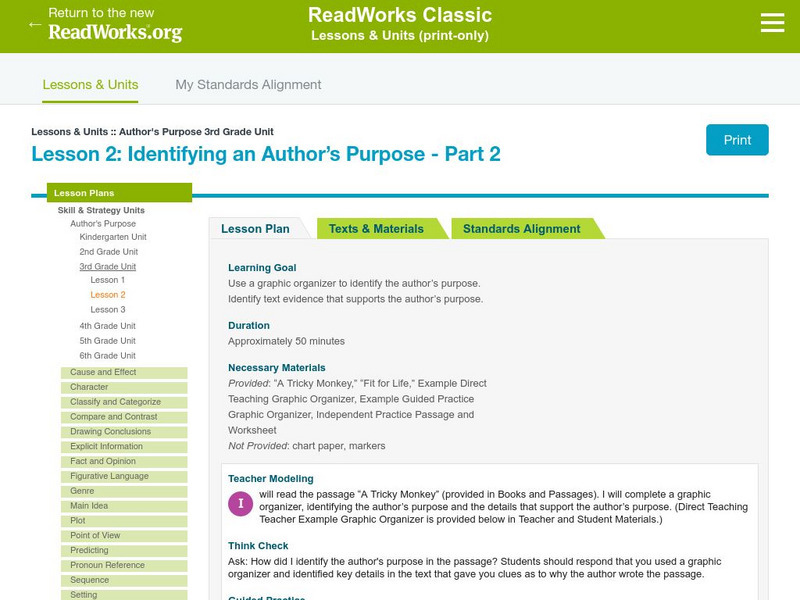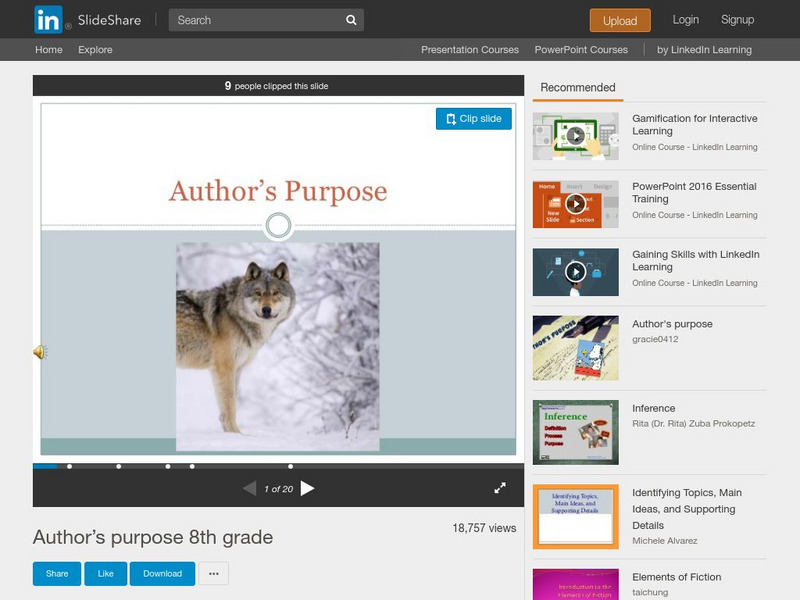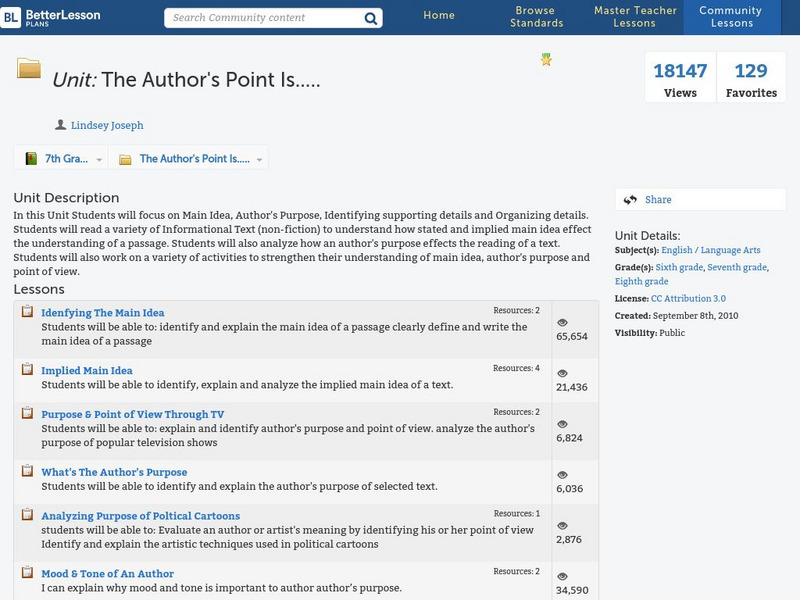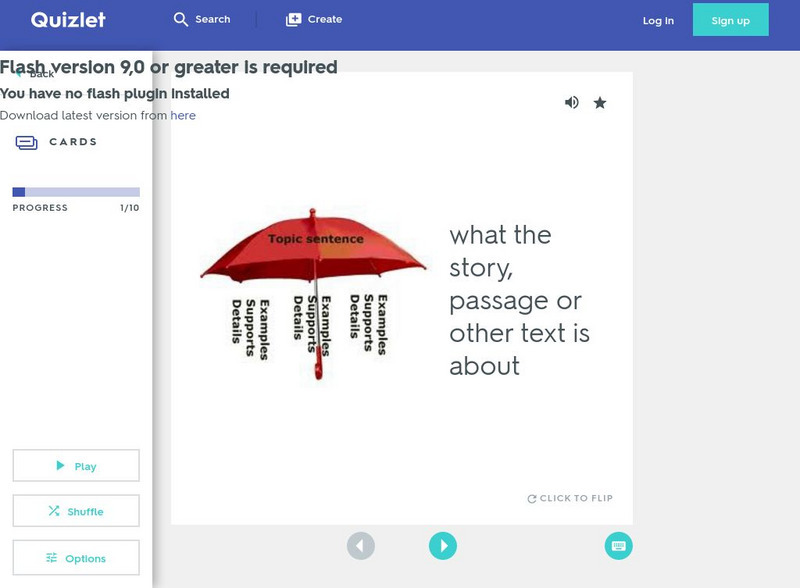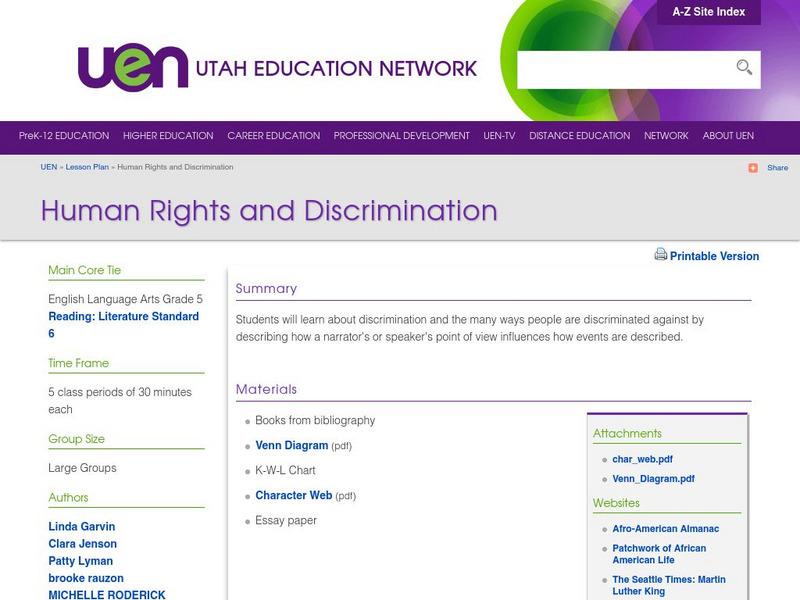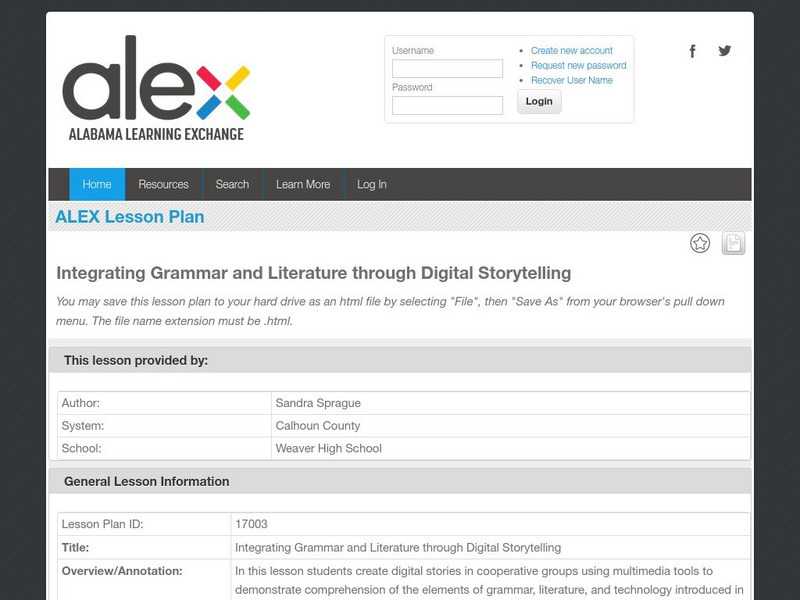College Board
Evaluating Sources: How Credible Are They?
How can learners evaluate research sources for authority, accuracy, and credibility? By completing readings, discussions, and graphic organizers, scholars learn how to properly evaluate sources to find credible information. Additionally,...
Read Works
Read Works: 3rd Grade: Author's Purpose: Lesson 2
[Free Registration/Login Required] This lesson plan helps students learn to identify an author's purpose.
E Reading Worksheets
E Reading Worksheets: Author's Purpose Lesson
In this learning module, students will learn about authors' purposes for writing. PowerPoint lessons, worksheets, and quizzes are provided to reinforce the understanding of why authors write assorted pieces. This module is designed to...
E Reading Worksheets
E Reading Worksheets: Author's Purpose Worksheets
In this learning module, students will learn more about author's purpose. Worksheets and PowerPoint lessons are provided to help students analyze authors' purposes more effectively. This module is designed to support Tier I, Tier II, and...
Sophia Learning
Sophia: Referencing the Author's Purpose
This lesson explains how to reference an author's purpose when answering a reading comprehension question. This tutorial shares an audio version of the lesson's content. [3:14] RI.11-12.6 Eval Purpose, Rhetoric, Style
Thinkport Education
Thinkport: Analyzing Data Sources and Author's Purpose: Electric Currents
In this science-themed literacy lesson, students learn how to determine the author's purpose and follow the development of that purpose.
Tom Richey
Slide Share: Author's Purpose 8th Grade
A slideshow with twenty slides with information and examples of four different purposes an author can have for writing a text: to entertain, to persuade, to express, or to inform/explain.
Better Lesson
Better Lesson: Unit: The Author's Point Is
Students will focus on Main Idea, Author's Purpose, Identifying supporting details and Organizing details. Students will read a variety of Informational Text (non-fiction) to understand how stated and implied main idea effect the...
ReadWriteThink
Read Write Think: Defining and Exploring an Author's Stylistic Choices
Contains plans for two lessons that teach students how to recognize an author's use of style in literature. These plans use "Their Eyes Were Watching God" by Zora Neale Hurston as an example, but the basic ideas can be adapted to other...
British Library
British Library: 19th Century Non Fiction Texts: Crime & Punishment
This thematic collection will allow students to read and understand 19th-century non-fiction texts, and support them in identifying key features for a range of genres, audiences, and purposes. Each source is accompanied by original...
British Library
British Library: 19th Century Non Fiction Texts: Work & Welfare
This thematic collection will allow students to read and understand 19th-century non-fiction texts, and support them in identifying key features for a range of genres, audiences, and purposes. Each source is accompanied by original...
British Library
British Library: 19th Century Non Fiction Texts: Gender, Behaviour & Etiquette
This thematic collection will allow students to read and understand 19th-century non-fiction texts, and support them in identifying key features for a range of genres, audiences, and purposes. Each source is accompanied by original...
British Library
British Library: 19th Century Non Fiction Texts: Education
This thematic collection will allow students to read and understand 19th-century non-fiction texts, and support them in identifying key features for a range of genres, audiences, and purposes. Each source is accompanied by original...
Quizlet
Quizlet: Ccisd 4th Grade Main Idea Flashcards
Reading strategy terms (nonfiction) are included in this review exercise. Flashcards are provided for the following words: topic, main idea, supporting details, summarizing, conclusion, point of view, author's perspective, author's...
Florida Center for Reading Research
Florida Center for Reading Research: Text Analysis: Persuade, Inform, Entertain Sort
A lesson plan in which students read short texts and sort them according to the author's purpose: to persuade, to inform, or to entertain. Materials are included. [PDF]
Utah Education Network
Uen: Human Rights and Discrimination
This unit plan from the Utah Education Network engages students in understanding how authors backgrounds often impact their writing choices. "Human rights" and "discrimination" are the featured topics in the five texts incorporated in...
University of Maryland
Voices of Democracy: John Fitzgerald Kennedy, "Inaugural Address" January 1961
John F. Kennedy's inaugural speech is one of the most famous speeches in American history. Teachers can use this activity to teach Language Arts standards, as well as Social Studies standards. This lesson plan includes pre-reading ideas,...
Other
The Literary Link: Washington Irving: On Style and Purpose in Short Story
Two excerpts from Early American author Washingtom Irving about his preference for writing short works and why.
Alabama Learning Exchange
Alex: Grammar and Literature Through Digital Storytelling
In this lesson students create digital stories in cooperative groups using multimedia tools to demonstrate comprehension of the elements of grammar, literature, and technology introduced in the lesson. Students become actively involved...
Annenberg Foundation
Annenberg Learner: Workshop 2: Making Writing Meaningful
Workshop 2 demonstrates how teachers use authentic sources and topics to prompt students to write about things that matter to them, subjects that relate to their lives, relationships, and communities. The topic may be the students -...
Other
Lopez Books: Joseph Bruchac Essay
Joseph Bruchac gives a detailed description of his life and also discusses his involvement as a writer of Native American literature. Bruchac discusses his time as a volunteer teacher in West Africa, his memories of growing up with his...
Wisconsin Response to Intervention Center
Wisconsin Rt I Center: Text Dependent Questions [Pdf]
Describes a reading strategy where students must respond to text by supporting their ideas with text-based evidence. Lists different categories of questions the teacher can prepare based on the text chosen, with examples for each.
TES Global
Tes: Non Fiction Unit 4 Formal/impersonal Writing: Tourists
[Free Registration/Login Required] Students will analyze tourism brochures to determine features related to nonfiction writing in this unit. Tourism websites may be used in lieu of the brochures. Cotswold and the North Leigh Roman Villa...
Reading Rockets
Reading Rockets: Looking at Writing: First Grade
First graders write many times a day to express their interests - they are writing with a purpose through stories, letters, and lists. In this section, you'll find writing assessment resources, writing strategies, and additional tip...
Other popular searches
- Authors Purpose Powerpoint
- Authors Purpose Mini Lesson
- Authors Purpose Passage
- Teaching Author's Purpose
- Main Idea Authors Purpose
- Teaching Authors Purpose
- Authors Purpose Persuade
- Authors Purpose for Writing
- Identify Authors Purpose
- Author's Purpose to Inform
- Authors Purpose to Entertain
- Identifying Author's Purpose

